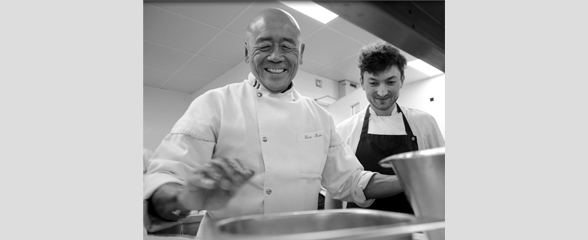 | In his interview, renowned chef Ken Hom recounts his life story from growing up in Chicagos Chinatown to his later success, including teaching at the California Culinary Academy and publishing his two successful cookbooks East Meets West and Taste of China. He expresses his passion for food and his excitement at the globalization of food culture as Chinese and Asian food gains respect and recognition abroad. He shares his views on the future of the culinary arts as well as the meaning of food on a personal level, covering topics such as fusion cooking and cooking techniques from around the world. | 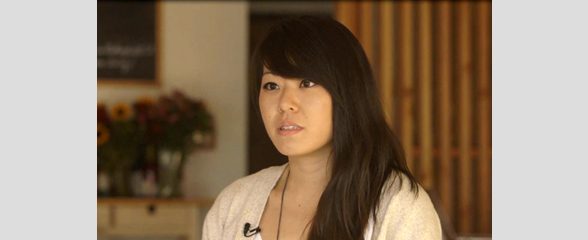 | Vivian Ku, owner of the fast-casual Taiwanese restaurant Pine & Crane, talks about her journey to opening up her restaurant and the decisions she made along the way. She particularly details how her familys background and her grandmothers cooking influenced what dishes she puts on her menu and what type of restaurant she wishes to run. Her belief in the family values behind the Chinese food culture continues to drive her down the path as a restauranteur. | 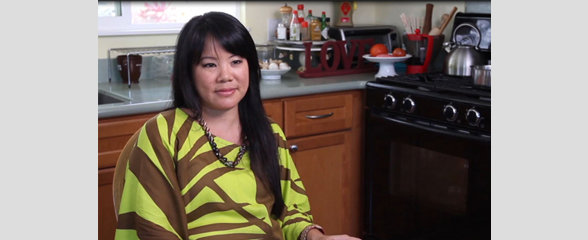 | This oral history focuses on Yvette Lee, a Chinese American home cook who was born and raised in Pauoa Valley, Honolulu, Hawaii. The daughter of two immigrants from Hong Kong, Yvette Lee learned to cook from watching her parents in the kitchen. A pescatarian, Lee derived inspiration for her homey, eclectic cooking style from the vegan dishes her mother made when she was a child, as well as from Hawaiis rich cultural diversity. In this oral history, Lee discusses food as a means of cultivating community and togetherness, a powerful healing force, and a method of self-expression. | 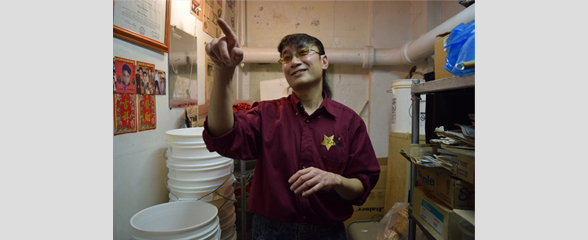 | Leonard Liao was born and raised in Chinatown and Flushing, New York during the 1970s and 1980s. Given that his paternal grandfather and father once lived in Cuba, Liao grew up eating both Chinese and Latino Cuisine. Given that he was influenced by both Chinese and Latino culture, Liao understands what it is to retain loyal customers from the Latino community. The legacy Liao hopes to leave is to inform everyone to do whatever one is passionate to do. | 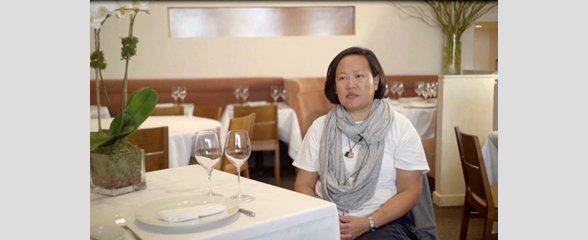 | Anita Lo is a first-generation Chinese American chef. Lo grew up in Birmingham, Michigan, and developed her interest in multicultural food at an early age. Leaving her white suburban hometown to attend boarding school in Massachusetts, Lo was introduced to a wide variety of cultures and people. She went on to study French at Columbia University, traveling abroad to attend Columbias French institute in Paris, where she quickly fell in love with French cuisine. After returning from abroad, graduating, and working at several New York City restaurants, Lo returned to France and attended the culinary school Ecole Ritz-Escoffier. Lo returned to New York and worked in several prominent eateries, including chef David Waltuck’s Chanterelle. Having developed her own unique contemporary American style and seeking creative control over her cooking, she opened her own restaurant Annisa in 2000. Lo describes her interest in adventurous, multicultural food and notes the importance of sustainably sourcing ingredients, especially seafood. She aspires for a more inclusive and equitable restaurant world. In the future, Lo hopes that minority chefs will be allowed to diversify their cooking beyond ethnic food and pave the way for less racialized kitchen spaces. | 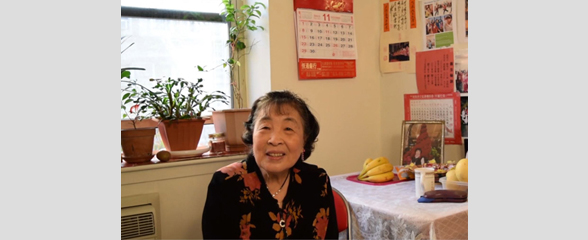 | Ni Biying talks about her experiences growing up in China and her experience with food over the years as she survives the Japanese invasion from an early age and moves to the US to find work during her adulthood. She imparts interesting knowledge about the regional cuisine from Fujian, China (Fujianese food) and gives insight into the types of food eaten from her rural roots in China. She describes food eaten during times of poverty as well as the difficulties she experiences while trying to make a living in New York City, ultimately settling down after being reunited with her children who moved to the US in the mid-1990s. | 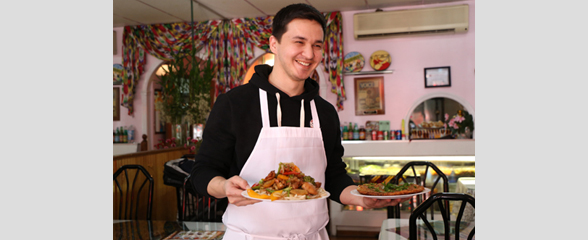 | Doniyar Sobitov was raised in Tashkent, Uzbekistan and moved to New York City in 2007 with his father and brother. His family opened their Halal Uzbek restaurant called Café Kashkar together in Brooklyn. Café Kashkars food is based on cuisine from the Kashgar region, a city in the western side of Chinas Xinjiang province. During this oral history interview, Sobitov describes his childhood in Tashkent, learning to cook with his father, and his aspiration to attend culinary school in China eventually. He goes on to explain that food is not only an important aspect of Uzbekistan culture, but also a means for life and survival for his family. Sobitov lives in the United States with his father, brother, and sister, but his mother, wife, and two year old child still live in Tashkent, a division that is difficult for his family. Describing the multilingual neighborhood in which Café Kashkar is located, Sobitov explains that he speaks four languages in addition to english to communicate with his diverse customer base: Turkish, Uzbek, Russian, and Uyghur. He emphasizes the similarities between Uyghur and Chinese food, describing them as “basically the same thing†and adds that Cafe Kashkar imports some of its key ingredients from Xinjiang. | 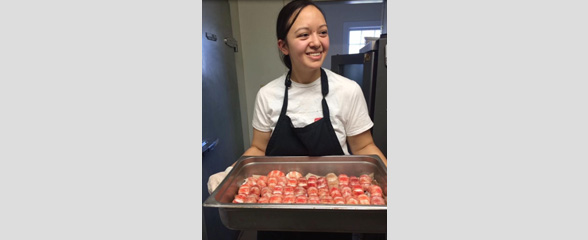 | Cara Stadler is a third-generation Chinese American chef. She was raised in Massachusetts and grew up biracial in a predominantly white community. Stadlers love of food began during her childhood, when her mother would make a wide variety of Shanghainese dishes. While Stadlers culinary education began in her mothers kitchen, her career experience started in American restaurant kitchens. She worked under Marsha McBride at Cafe Rouge in Berkley and then Striped Bass in Philadelphia. As her passion for food grew and she realized she wanted to pursue a professional career in the culinary arts, she moved to France to hone her fine dining skills. Stadler studied the artistry and technical precision of French cooking while working at Guy Savoy and Gordon Ramsays Au Trianon Palace. Afterwards, she worked in different parts of East Asia including China and Singapore. During this period she launched the prive fine dining service Gourmet Underground in Beijing. Stadler returned to the U.S. in 2011 and collaborated with her mother to open her first restaurant Tao Yuan in Maine. They also later opened Bao Bao Dumpling House together. Stadler credits food for reconnecting her to her Chinese heritage. She expresses excitement at the growth of ethnic foods in the United States, noting that the American public is increasingly open to foreign foods and flavors. Stadler also underscores the importance of sustainability and ethical ingredient sourcing in the food world, and she adds that she hopes to contribute to positive changes in the industry. | 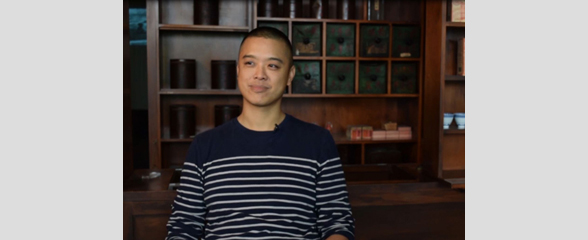 | Wilson Tang is a second-generation Chinese American restaurateur who was born in 1978 and grew up in Queens, New York. Before Tang was born, his parents decided to move out of Manhattans Chinatown to Queens to have a better family environment. Tang later found his way back to Chinatown when he attended college at nearby Pace University. After college, he went into a finance career, a path his parents strongly encouraged him to pursue. Tang quickly realized that the rat race of the traditional 9-5 job did not hold much appeal for him, and he began to consider entering the restaurant industry as his parents had done when they first immigrated during the early 1970s. Tangs first venture was a bakery opened in a building his father owned on Allen street. The bakery successfully ran from 2004 to 2007; however, success came at a steep price for Tangs personal health and well-being. Tang returned to the finance world in 2007 in order to regain control of his lifestyle and life-work balance. It was during this break from the restaurant world that Tang met his future wife and got engaged. In 2011 the opportunity to take over his uncle’s dim sum restaurant Nam Wah arose. More convinced than ever that the career of restauranteering was his true calling and despite the stress of his previous experience, Tang and his fiance decided to make the leap. The couple did some light renovations and refreshed the menu before opening, attempting to breathe new life into Nam Wah while preserving its historic atmosphere. As Nom Wah was renovated, Tang decided to create a Facebook page to document the long history of the tea parlor. The business received positive coverage from both the Daily News and the New York Times. As a result of this media coverage, business flourished and Nom Wah became a staple of Chinatown. Tang is grateful for the success he has experienced, but notes that the restaurant industry is still an incredibly demanding field. He hopes to use his success as a platform to elevate and support other Chinese American entrepreneurs and Chinatown businesses in NYC. | 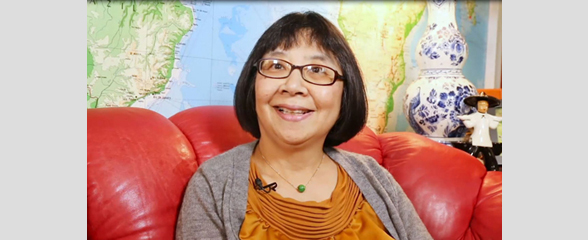 | Yvonne and Mike Thompson are restaurant owners who started their small business in Pounding Mill, Virginia in 1979. Their restaurant, Cuzs, brought an unexpected combination of Southern homestyle cooking with Chinese cuisine to their small coal mining town. Yvonne was born and raised in Hong Kong and describes enjoying delicious home cooked meals as well as dim sum restaurants and banquets during her childhood. She later moved to St Louis, Missouri to attend college and work in her Uncle Wongs upscale Chinese restaurant The Lantern House. Eventually opening a barbeque restaurant on her husband Mikes family dairy farm, Yvonne explains how she gradually shaped their menu to include American Southern-Chinese fusion dishes like their popular cheese eggroll. Yvonne is proud of the cultural impact Cuzs has had on their small coal-mining community. Mike Thompson was born and grew up in Cedar Bluff, Virginia. While several of his family members became doctors and pursued the medical field, the family also owned and operated a large 5,000 acre farm. Mike fondly describes his childhood experiences of enjoying his mothers homestyle Southern cooking and hospitality. He goes on to describe how he opened Cuzs restaurant with his wife Yvonne on his familys farm. Mike notes that international travel has played a significant role in expanding his palette and improving his cooking. |









